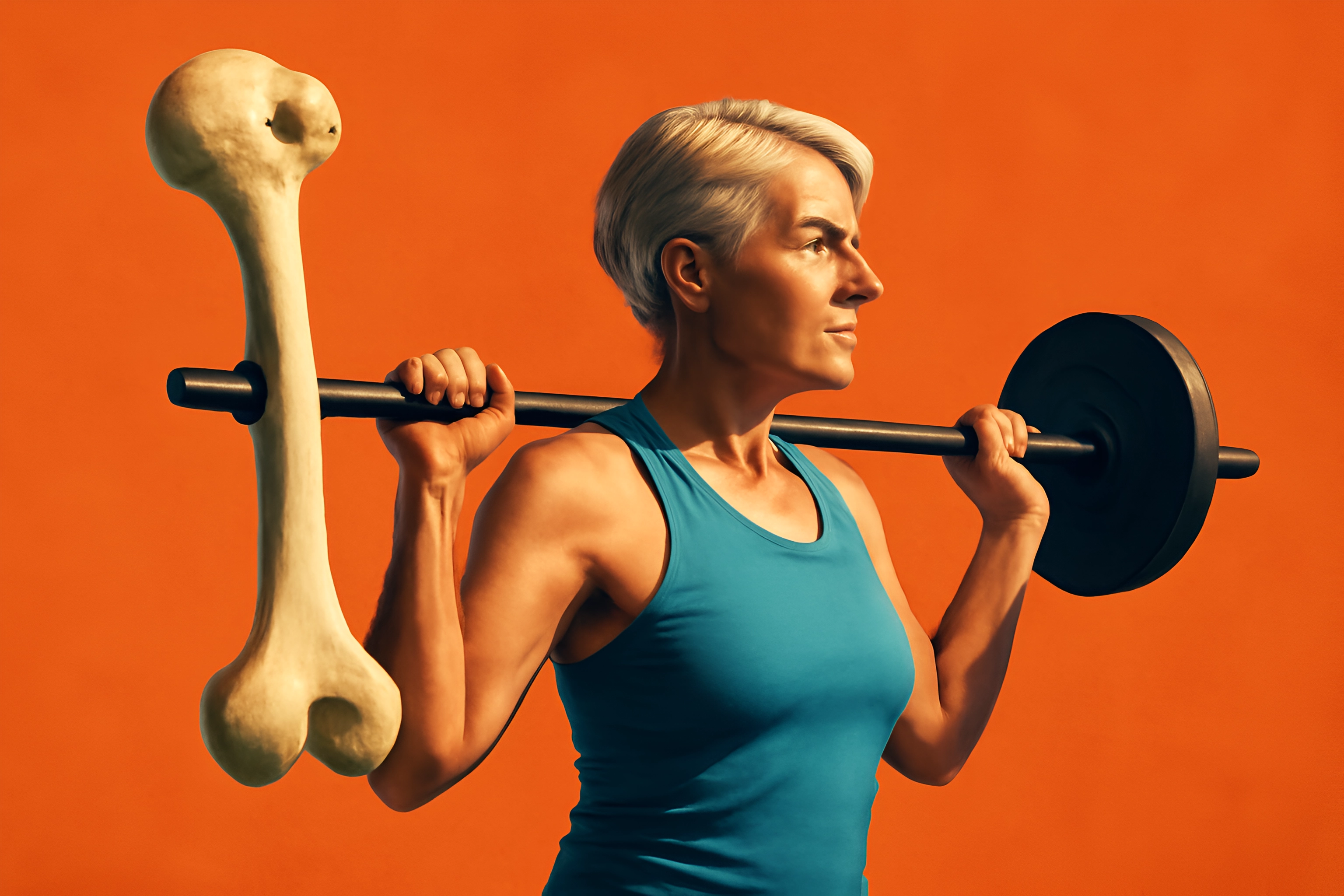
That sudden, creeping heat that rises from your chest to your face. The nights spent staring at the ceiling, your mind racing while your body begs for rest. The feeling that you’re a stranger in your own skin, navigating a sea of unpredictable moods. Does any of this sound familiar? If you’re nodding your head, know this: you are not alone, and you are not broken.
This is menopause. It’s not a disease to be cured, but a profound biological shift—a transition into a new and powerful phase of life. Here at FitOverFifty, we believe this isn't an ending; it's an awakening. It’s your body’s signal to tune in, listen closely, and reclaim your vitality on your own terms.
Forget everything you’ve been told about this being a time of decline. We’re here to rewrite that story. This guide is packed with actionable, evidence-based, and natural menopause management tips for women over 50. We will explore three foundational pillars to help you find your equilibrium: nourishing foods that work for you, mindful movement that builds strength, and restorative wellness habits that calm the storm within.
Nourish to Flourish: Your Menopause-Friendly Plate
What you place on your fork is one of the most powerful tools you have to navigate this transition with grace. Food isn't just fuel; it's information that tells your hormones how to behave. By making strategic choices, you can directly combat symptoms and build a foundation of vibrant health.
Incorporate Phytoestrogens: Nature's Helpers
Have you ever heard of phytoestrogens? Think of them as nature’s little helpers. These are plant-based compounds that gently mimic the effects of estrogen in your body, helping to fill the gaps left by hormonal fluctuations. According to the National Council on Aging, incorporating phytoestrogens can help manage symptoms like hot flashes.
You don’t need to search for exotic ingredients to find them. They are readily available in foods like flaxseeds, chickpeas, lentils, and organic soy products like tofu and edamame. A simple, powerful habit is to add a tablespoon of ground flaxseed to your morning smoothie or oatmeal—an easy step toward better hormonal harmony.
Prioritize Bone Health: Calcium and Vitamin D are Non-Negotiable
One of the most critical health shifts during menopause is the increased risk of osteoporosis. As estrogen levels decline, so does our bone density, making us more vulnerable to fractures. In fact, women can lose up to 20% of their bone density in the five to seven years following menopause, as noted by the Cleveland Clinic. This is a non-negotiable area of your health that demands attention.
Protecting your bones is a cornerstone of long-term vitality. While dairy is a well-known source of calcium, you can also find it in leafy greens like kale and spinach, fortified plant milks, and fatty fish like salmon and sardines. For Vitamin D, which is essential for calcium absorption, sensible sun exposure and fortified foods are key. For a deeper dive, explore these holistic approaches to bone health that combine nutrition and mindful movement.
Tame the Triggers: Foods to Moderate
Do you ever notice that a glass of wine or a spicy meal is followed by a hot flash or a restless night? Your body is sending you signals. Certain foods and drinks can act as triggers, exacerbating symptoms by causing shifts in blood sugar and body temperature.
This isn't about harsh restrictions; it's about mindful awareness. Gently consider moderating your intake of caffeine, alcohol, spicy foods, and refined sugars, as recommended by naturopathic experts. Pay attention to how you feel after consuming them. Choosing to reduce these triggers is an empowering act of self-care that puts you back in control.
Move with Intention: Your Best Defense Against Menopause Symptoms
Movement is medicine, especially during this chapter of life. The right kind of exercise is your secret weapon against weight gain, mood swings, and bone density loss. It’s one of the most effective menopause lifestyle tips for reclaiming your strength and energy.
Strength Training for a Strong Foundation
As we age, we naturally lose muscle mass, and menopause can accelerate this process, slowing down our metabolism. The solution? Pick up some weights. Strength training is your number one tool for boosting your metabolism, preserving lean muscle, and, crucially, building stronger bones.
You don’t have to become a bodybuilder. Simple and effective routines using bodyweight exercises, resistance bands, or light weights can make a world of difference. For a safe and effective starting point, check out this guide to adaptive resistance training for seniors. Every lift and every press is a deposit into your future health account.
Consistent Cardio for Heart and Mood
Feeling irritable or down? A brisk walk might be the best therapy. Cardiovascular exercise is essential for maintaining a healthy weight and protecting your heart, but its benefits for your mood are just as profound. According to the Mayo Clinic, activities like yoga and tai chi can improve mood and balance.
Activities like brisk walking, swimming, cycling, or dancing get your heart pumping and release endorphins—your body’s natural mood elevators. Aim for at least 30 minutes most days of the week. Find an activity you genuinely enjoy, because consistency is what delivers the incredible results you’re looking for.
Sleep Hygiene: Reclaiming Your Rest
Is there anything more frustrating than a sleepless night? Disrupted sleep is one of the most common complaints of menopause, and it has a direct, negative impact on your hormones and overall well-being. It’s time to reclaim your right to a restorative night’s sleep.
Creating a sanctuary for sleep is a powerful act of self-care. Start by implementing a few simple sleep hygiene rules. Keep your bedroom cool, dark, and quiet. Establish a consistent sleep and wake schedule, even on weekends. Most importantly, create a relaxing pre-bed routine—turn off screens an hour before bed and try reading, gentle stretching, or listening to calming music instead.
Calm the Cortisol: Why Stress Management is Key
If you feel like you’re constantly running on empty, your stress hormone, cortisol, is likely working overtime. Chronic stress floods your body with cortisol, which can worsen nearly every menopause symptom, from belly fat and hot flashes to anxiety and brain fog. Managing your stress is not a luxury; it is an essential strategy for hormonal harmony.
Embrace Mindful Practices
You don’t need to retreat to a monastery to find your calm. Simple, accessible mindfulness practices can dramatically lower cortisol levels and restore a sense of peace. A review of studies published by the National Center for Biotechnology Information (NCBI) supports the use of mind-body practices for managing menopause symptoms.
Try this simple exercise right now. Sit comfortably, close your eyes, and focus on your breath.
Inhale slowly through your nose for a count of four.
Hold your breath gently for a count of four.
Exhale slowly through your mouth for a count of six.
Repeat for three minutes.This simple practice can be done anywhere, anytime you feel stress rising. For more guidance, explore these integrative approaches for stress-free living.
Consider Herbal Allies & Supplements (Integrative Remedies)
Sometimes, our bodies can benefit from a little extra support from nature. Certain herbs and supplements have been studied for their potential to ease menopause symptoms, offering a complementary approach to your lifestyle changes.
Always consult your healthcare provider before adding any new supplement to your routine. This is crucial to ensure it is safe for you and won't interact with any medications. Some well-researched options to discuss with your doctor include Black Cohosh for hot flashes, Magnesium for sleep and mood, and Maca Root for energy and libido.
Your Journey, Your Power
Navigating menopause is a journey, not a destination. It’s about tuning into your body’s unique needs and responding with compassion and strength. By focusing on these three pillars—nourishing your body with whole foods, moving with intention and joy, and calming your mind with restorative habits—you can take back control.
This is your time to thrive. These natural menopause management strategies are your tools to build a future filled with energy, confidence, and an unshakable sense of well-being. You are in the driver's seat of your health, and the road ahead is bright.
What is one natural tip that has helped you on your menopause journey? Share your wisdom in the comments below—let's support each other!
For more practical wellness tips delivered right to your inbox, subscribe to the FitOverFifty newsletter.












